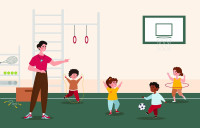Life & Style
Are you crushing your child’s self-esteem?
Self-esteem cannot be achieved if your child is constantly being measured by societal standards.
Sujina Manandhar
“My child scored Grade A in the examination. How much did your kid score?” “Have you seen falano’s (somebody’s) children? They are so good at everything. And you? What are you good at?”
We have all grown up hearing similar remarks directed at us in one way or another, and unfortunately, parents and elders continue to make such remarks at their children.
What we see here depicts a typical trait wherein our children get routinely compared with others. And sadly, our society considers it normal to compare one’s kids to their siblings, cousins, friends, acquaintance, and even strangers.
But are we aware of the impact of constantly comparing one’s child with another? Just imagine how that child would start viewing himself upon being subjected to such ruthless comparisons over the course of growing up.
A very famous theory by Humanistic Psychologist Carl Rogers states that we come to see ourselves as others see us. Especially the way parents view their kids during their formative years makes all the difference. The catastrophic nature of comparisons can seriously distort the child’s self-image, thereby fuelling self-doubt, self-criticism, and lowered self-esteem. Yet, we unknowingly tend to put our kids in such awkward positions repeatedly, be it via our words or actions.
And what’s even worse is that even if the child is not being compared to others, then s/he will be compared with an image of what parents want their ideal child to live up to. So what happens next? A similar pattern of distorted self-image ensues.
Take, for example, something like the tendency among the major sections of our society to believe that scoring well on tests is of utmost importance. Children often become the target of intense scrutiny and even harsh punishment if they fail to achieve the grades their guardians expect them to score. If children don’t live up to the standards set by their parents, they get treated otherwise. Moreover, they are frequently reminded of their shortcomings. Over the course of years, children will consider studying as nothing more than an obligation forced upon them. They may even come to despise studying. As a result, their academic performance would further deteriorate. They may even view themselves as a failure, doubt their competence, and develop thoughts like “What is the point in trying? I will fail, anyway.” Such a distorted self-image and lowered self-esteem feed upon themselves and make children more vulnerable towards developing mental health problems.
So what should you do instead?
Understand that your child is an individual
Accept the fact that your child is an individual and, therefore, unique. Stop comparing your child with anyone else.
Imagine how hurtful it would be if your child compared you to someone else and said, “My friend’s parents are so much better than mine.” Try to understand that it’s the same kind of hurt the child feels when you compare him/her to someone else’s.
Stop trying to make your child someone s/he is not. Instead, try to understand your children as they are and help them understand themselves. Self-esteem is something that comes from within, through self-awareness of who they are. Self-esteem can not be achieved if your child is constantly being measured by societal standards. The belief that who they are is dependent on something outside takes away their sense of control over their own life, which can be more detrimental to their self-esteem.
The power of positive feedback
Instead of pointing out your child’s problems, embrace his/her qualities and nurture their positive traits while trying to help them slowly change their negative qualities. When you notice your child making some progress, make sure you praise him/her. A few encouraging words can go a long way to boost your child’s self-esteem. It will even provide them with the motivation to keep working hard.
Encourage your kids to take action
Qualities like self-esteem and confidence are built through action. Our brains learn through experience. Help your child do the things they want to feel more confident in. Begin with some small steps. Create interesting challenges that are achievable. When they successfully complete them, praise them for their accomplishment.
Be careful not to set the bar too high. Research suggests that when tasks are too challenging during the initial phases of any activity, individuals tend to give up and lose their confidence. Instead, increase the difficulty level slowly and gradually. This ensures that children won’t lose interest in what they do. Moreover, this way, they tend to be persistent until they trust their own competence.
Be patient
Understand that while you are trying to be a better parent, your child is just learning to be better too. Help your child along in their growth without putting much pressure at once or expecting immediate changes in them. Accept the fact that changes can’t happen overnight. So, be patient; it’s a process.




 14.24°C Kathmandu
14.24°C Kathmandu










